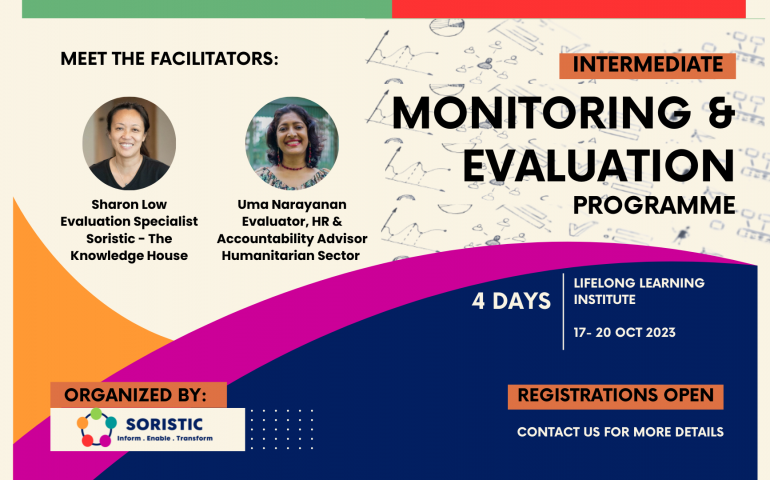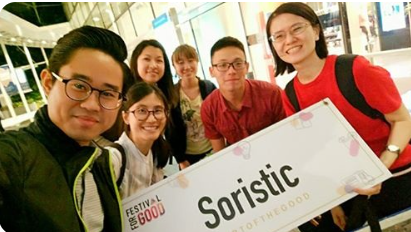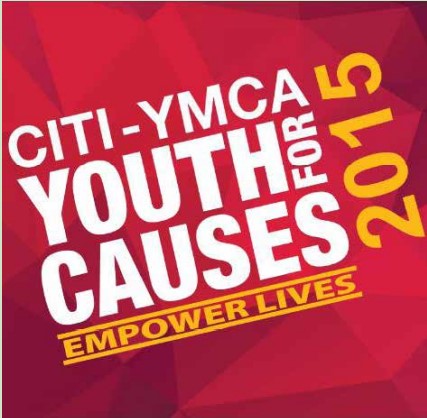Overview:
This programme is facilitated by seasoned monitoring and evaluation (M&E) practitioners and is aimed at supporting existing M&E practioners to deepen their M&E knowledge and skills. There will be sharing of best practices and standards of evaluation. As far as possible, participants projects or programmes will be used to demonstrate the applications of the concepts as well as their related methodology limitations.
Prerequisite: As this is an intermediate programme, all participants are expected to have a basic foundation and understanding of monitoring and evaluation processes and practices.
Programme Outline:
Day 1:
- International Principles and Standards of Evaluation (AM) | Target Participants: Funders & Practitioners
This module aims at refreshing participants’ existing knowledge of the basics of evaluation standards and principles. It will also be introducing new concepts such as the Core Humanitarian Standards which affirms a rights-based approach and alignment with international law and declarations
- Concept I – Types of Evaluation (PM) | Target Participants: Funders & Practitioners
The purpose of this module is to provide an overview of methods commonly used in social sector research and evaluation. Emphasis will be given to different evaluation methods which include Formative Evaluation, Summative Evaluation, Development Evaluation etc.
Day 2:
- Accountability Lens in Monitoring and Evaluation (AM) | Target Participants: Funders
Accountability remains one of the most critical areas of interest for Funders. It is imperative that organisations account for its activities, accept responsibility for them, and disclose results in a transparent manner. Experts have often suggested that organisations with high accountability and credibility are often preferred by donors and are more likely to get funded. There are different types of accountability such as Upward Accountability, Horizontal Accountability, Downward Accountability and Internal Accountability
- Utility of evaluation for funders (PM) | Target Participants: Funders
Funders are focussed on the social impact their funding will create. Measuring and reporting outcomes helps drive funding and increases competitiveness in the market. For funders, it is imperative to see proven and demonstrated long term positive outcomes in relation to their funding.
Day 3:
- Concept II – Common Evaluation Techniques (Full Day)| Target Participants: Funders & Practitioners
Usage of various evaluation methods and techniques help organisations be specific about the changes they hope to see and the strategies appropriate to achieve them. Evaluation techniques covered include outcome mapping, outcome harvesting, journey mapping, process tracking and photovoice. Participants can submit brief description of their evaluation projects as case studies for the facilitator to discuss the usage of evaluation techniques.
Day 4:
- Using Qualitative and Quantitative Data to Make Meaningful Decisions for Strategic Planning (Full Day) | Target Participants: Practitioners
A lot of data is collected by social purpose organisations when they carry out their programmes. Sometimes, the data is not used at all. This module will share with participants how to turn data into insights that can be used to make meaningful decisions, especially for strategic planning. This module will cover aspects from data collection, management, analysis to report your findings. Some useful data analysis methods will be covered.
Who should participate:
- Practioners working on evaluation of social projects from non-profit organisations, government bodies, corporates and other social purpose organisations.
- Funders in advancing their knowledge and best practices in designing and funding monitoring and evaluation.
For Practioners: This programme will introduce best practices and a range of data collection and analysis approaches to determine what works and what doesn’t work, to gauge if the project is fit-for-purpose, as well as its progress towards meeting its outcomes and impact. A good monitoring and evaluation system ensures transparency, and in turn accountability to all stakeholders.
For Funders/Donors: This programme will introduce potential utility of evaluation findings for funders; as well as approaches to conduct real-time monitoring of projects or programmes. The focus will be on building on a systems approach so that funders understand the practitioners’ and stakeholders’ perspective of intended outcomes and impact.
Facilitators & Organiser Profiles:
Ms. Sharon Low:
Ms. Sharon Low has worked in conflict-affected and fragile countries across Asia, Africa, and the Middle East. She started her monitoring and evaluation trajectory in the People’s Republic of China for the 1998 post-flood operations and in Democratic People’s Republic of Korea for the 1999 post-tsunami operations. In recent years, she contributed to national-level M&E systems in Afghanistan, Somalia, and an Asia-Pacific non-profit for their country programmes. She has designed and operationalised large scale surveys, process and impact evaluations with academic institutions, non-government organisations, civil societies, and the United Nations. In recent years, she is involved in alternative data types like satellite imagery, geospatial, photovoice and participatory data analysis processes. Currently, she supports the ethnic-led Health Information Systems Working Group along the Myanmar border in adapting it’s operating approach given the evolving political change.
Ms. Uma Narayanan:
Ms. Uma Narayanan specialises in human resources and organisational development for medium to large scale organisations in the humanitarian sector. Ms. Narayanan has a background in International Organisational and Systems Development and worked as an Organization Development and Human Resources practitioner mostly in Southeast Asia and South Asia, for almost a decade. In her OD capacity, she has carried out numerous assignments on program reviews, evaluations and organisational assessments. Ms. Narayanan is committed to quality and accountability in the humanitarian sector. She has recently carried out accountability reporting (evaluation using accountability standards) for Covid-19 emergency response. As a Facilitator, Ms. Narayanan has organised, designed, co-facilitated and facilitated over 100 workshops and training sessions both locally and internationally for various organisations.
Soristic:
Soristic is a social impact consultancy enabling non-profits, businesses and communities to achieve higher impact through impact monitoring and evaluation, social sector research, capacity building and CSR consultancy services. Soristic also developed Charity GuidePoint, a data driven giving tool that aims to drive philanthropy and charity transparency in Singapore through empowering donors and charities with access to quality data analysis of the charity sector. Driven by big data analytics, it quantitatively analyses the entire universe of Institutions of Public Character in Singapore. From 2021, Soristic has been publishing a list of Singapore’s Biggest Philanthropic Organisations based on publicly available data.
Fees (In Singapore Dollars):
1. Full Programme (4 Days):
- Normal Category: $2,980
- Early Bird (Before 8 September 2023): $2,380
- Group Rate (3 pax or more): $2,280
2. Standards, Accountability and Utility Track (Day 1 and Day 2):
- Normal Category: $1,980
- Early Bird (Before 8 September 2023): $1,680
- Group Rate (3 pax or more): $1,580
3. Concepts and Analysis Track (Day 3 and Day 4):
- Normal Category: $1,780
- Early Bird (Before 8 September 2023): $1,480
- Group Rate (3 pax or more): $1,380
Register your interest by clicking the link here: https://bit.ly/3KlDHSe




